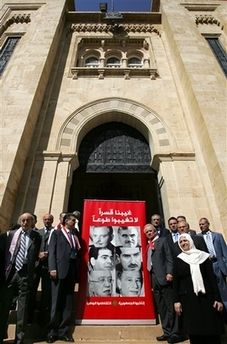 A bitterly divided Lebanese parliament adjourned Tuesday without officially beginning the process of selecting a new president.Two-thirds of members must attend before an official session can be held. The next session has been scheduled for October 23.Members of parliament arrived in armored convoys, traveling under the protection of security details. The downtown area was sealed off as concrete barriers diverted the normal flow of traffic.
A bitterly divided Lebanese parliament adjourned Tuesday without officially beginning the process of selecting a new president.Two-thirds of members must attend before an official session can be held. The next session has been scheduled for October 23.Members of parliament arrived in armored convoys, traveling under the protection of security details. The downtown area was sealed off as concrete barriers diverted the normal flow of traffic.
BEIRUT (AFP) – Dozens of Lebanese lawmakers gathered under heavy security in parliament on Tuesday for a crucial session aimed at electing a president and ending a long-running crisis that has paralysed the country. Many MPs arrived at the legislature in central Beirut under heavy military escort from a nearby luxury hotel.Several MPs stood outside the building briefly and held up a banner bearing the names and pictures of six fellow lawmakers killed since 2005 in attacks The latest victim, Antoine Ghanem, was assassinated last week in a car bombing in a Beirut suburb."We were forced out, don’t choose to be forced out" read the banner in a supposed message from the grave
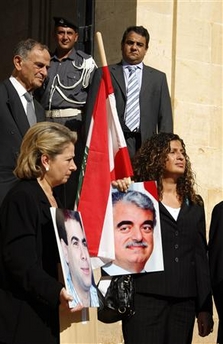 One MP, Ghinwa Jalloul, waved a Lebanese flag from her car and held up a picture of former prime minister and MP Rafiq Hariri whose assassination in February 2005 lies at the root of the current crisis."Long live Lebanon," she shouted to reporters before entering the building.The perimetre around the imposing structure was off-limits to normal traffic after elite troops and tanks deployed in the area. Checkpoints were also set up throughout the city creating traffic jams, and many businesses were shut.Ali Bazzi, an MP with the opposition Amal movement, reiterated that his camp would only take part in Tuesday’s session if the feuding political parties agreed on a consensus candidate.
One MP, Ghinwa Jalloul, waved a Lebanese flag from her car and held up a picture of former prime minister and MP Rafiq Hariri whose assassination in February 2005 lies at the root of the current crisis."Long live Lebanon," she shouted to reporters before entering the building.The perimetre around the imposing structure was off-limits to normal traffic after elite troops and tanks deployed in the area. Checkpoints were also set up throughout the city creating traffic jams, and many businesses were shut.Ali Bazzi, an MP with the opposition Amal movement, reiterated that his camp would only take part in Tuesday’s session if the feuding political parties agreed on a consensus candidate.
But many MPs said that was unlikely to happen, and the session was expected to focus on consultations among the rival parties.Several MPs said that speaker Nabih Berri would probably adjourn Tuesday’s session and call for parliament to reconvene around October 16 or 17, after the Muslim holy month of Ramadan.
Please click read more for more pictures
In a clear message to the opposition, MPs from the ruling majority said if there was no quorum and no vote on Tuesday, they would go ahead and elect a president with a simple majority when the next session convenes.
"We are taking part in today’s session to preserve our right to vote in a subsequent session with a simple majority," MP Elias Atallah told AFP before entering parliament.
"Our presence means that the first session has been convened, and the next session (there will be a vote) with a simple majority," MP Samir Frangieh said.
Lawmakers have between September 24 and November 24 to choose a candidate to replace President Emile Lahoud. A two-thirds majority is required for a candidate to be elected by parliament in the first round of voting. In the event of a second round a simple majority suffices.
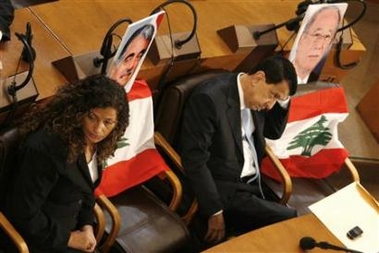
Lebanese anti-Syrian parliament members Ghinwa Jalloul (L) and Mohammed Itani sit beside posters of assassinated legislators in the parliament in downtown Beirut September 25, 2007. (Jamal Saidi/Reuters)
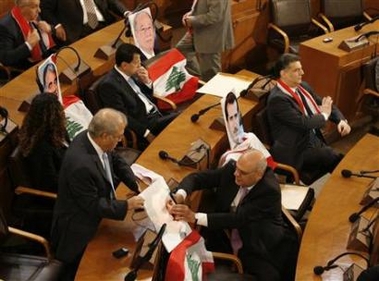
Lebanese parliament members sit beside posters of assassinated legislators in the parliament in downtown Beirut September 25, 2007. (Jamal Saidi/Reuters)
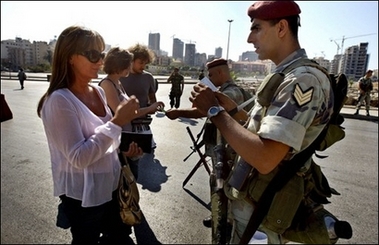
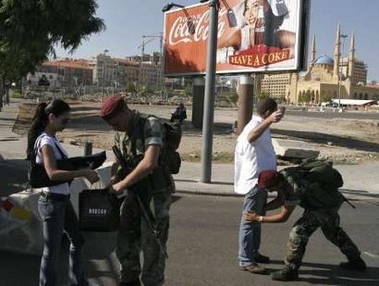
Lebanese soldiers frisk people at a checkpoint on a road around the Parliament headquarters in central Beirut September 25, 2007. Thousands of Lebanese troops tightened security around parliament in Beirut on Tuesday but a session called to elect a new president was set to be postponed after the opposition vowed to boycott it. REUTERS/Fadi Ghalioum (LEBANON)
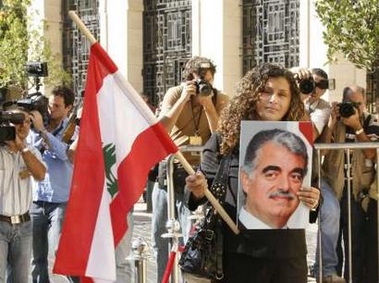
Lebanese anti-Syrian parliament member Ghinwa Jalloul carries a poster of assassinated former prime minister Rafik al-Hariri and the national flag during her arrival at parliament in downtown Beirut September 25, 2007. Lebanon’s deeply divided parliament failed to elect a new president on Tuesday and speaker Nabih Berri deferred the vote until October 23. REUTERS/Jamal Saidi (LEBANON)
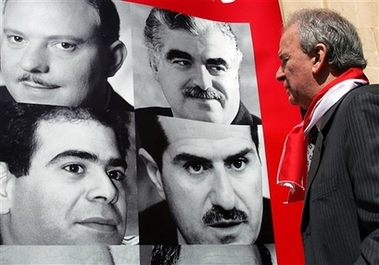
Lebanese anti-Syrian Lawmaker, Marwan Hamadeh, looks at a poster showing slain anti-Syrian lawmakers, from left above, Bassel Fleihan, Rafik Hariri, Pierre Gemayel, Jebran Tueini, at the entrance of the parliament building upon his arrival to vote for a new Lebanese President, in downtown Beirut, Lebanon, Tuesday Sept. 25, 2007. Lebanon’s parliament put off a session to elect a new president until Oct. 23, a parliamentary official said Tuesday, after the legislature failed to muster a quorum because of an opposition boycott. (AP Photo/Hussein Malla)
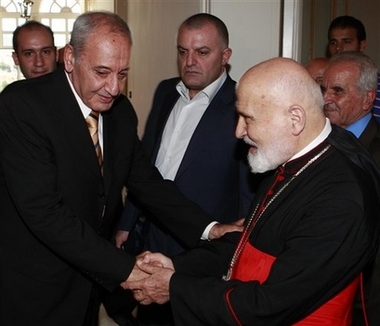
In this image released by the Lebanese parliament media office, Lebanese Parliament Speaker Nabih Berri, left, shakes hands with Cardinal Nasrallah Sfeir, head of Lebanon’s Maronite Church, right, at the patriarchal seat, in Bikirki northeast of Beirut, Lebanon, Monday Sept. 24, 2007. Berri on Monday, met with Sfeir, the influential spiritual head of the Maronite Catholic minority from which a president must hail under Lebanon’s sectarian-based political system. Tuesday’s parliamentary session, the first in the process to elect a president to replace Emile Lahoud by Nov. 24, was not expected to yield any results because the opposition, which is led by the militant Hezbollah group, was expected to boycott, thus denying the necessary two-thirds quorum for the first session. (AP Photo/Ali Fawaz, ho)
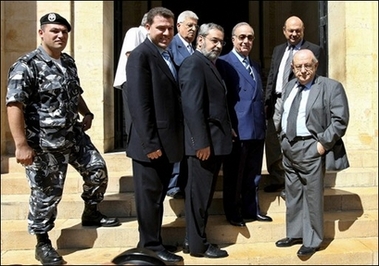
Lebanese opposition deputies arrive at the parliament in Beirut’s downtown. Lebanon’s parliament has adjourned for four weeks a crucial session to elect a new president for lack of a quorum and to allow more time for MPs to reach agreement on a consensus candidate.(AFP/Ramzi Haidar)
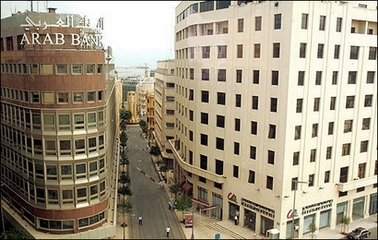
An empty street that leads to the parliament in Beirut’s downtown, 22 September 2007. Lebanon’s parliament convened on Tuesday under tight security for a session aimed at electing a new president but amid total deadlock among lawmakers on choosing a consensus candidate.(AFP/File/Anwar Amro)
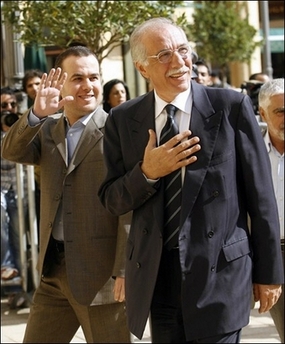
Lebanese opposition deputies Ghazi Zaaiter (L) and Hassan Fadlallah arrive at the parliament building in Beirut. Lebanon’s parliament was adjourned for four weeks a crucial session to elect a new president for lack of a quorum and to allow more time for MPs to reach agreement on a consensus candidate.(AFP/Marwan Naamani)
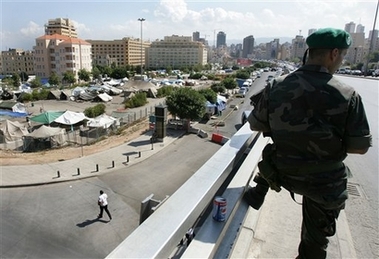
A Lebanese army soldier, stands guard on a bridge next to the tents of the Lebanese opposition supporters continuing their open sit-in since ten months to demand the government’s resignation, near the Lebanese Parliament building in downtown Beirut, Lebanon, Monday Sept. 24, 2007. Security forces, meanwhile, were poised to blanket downtown Beirut where the Parliament building is located with extra measures to protect the legislators after Thursday’s slaying of anti-Syrian lawmaker Antoine Ghanem.



